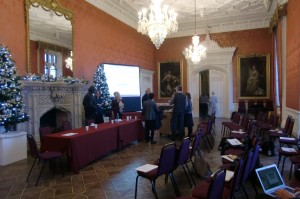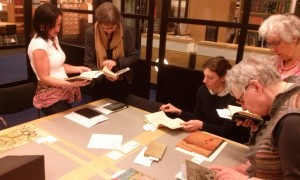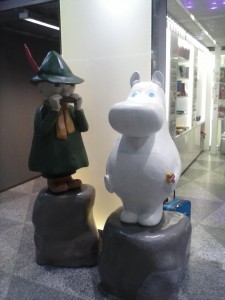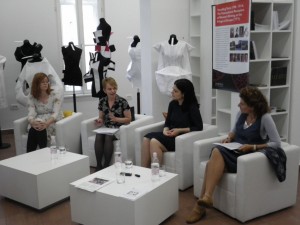During the past month I had the great pleasure to travel to the Galician city of A Coruña in the northwestern corner of Spain to find out more about Emilia Pardo Bazán´s connections with other women writers of her time. Pardo Bazán is arguably the most canonised of all Spanish nineteenth-century women authors. She has left a very impressive heritage, Continue reading
Blog
Exhibition in Progress: Selecting Material at the National Library of the Netherlands, by Wendela de Raat
During another inspiring meeting with our volunteers for the Dutch HERA TTT exhibition, we made a very exciting trip to the Bijzondere Collecties (Rare Collections) at the National Library of the Netherlands (KB) in The Hague. Apart from the simple joy of looking at beautiful books written by ‘our’ women writers we planned this visit because we wanted to make a first selection of material for the exhibition.
Photo: Arno Kuipers
Intern Remco Bloem prepared the session and ordered a great selection of rare old books from the 19th century which were waiting for us in a special room. Amongst those were Vroolijke Japanneesjes, an amazing picture book (translated from the English) by Tine van Berken (which will definitely be present at the exhibition) and the touching, beautifully illustrated story about a dog Hector: geschiedenis van een hond by Anna van Gogh-Kaulbach (another yes!). Other great works on the table were a collection of fairy tales by Augusta de Wit and Johanna van Woude’s Tom en ik (Tom and I) and its translation in English (by an man: Roger Action): A young wife’s ordeal . And what a treat to be able to look through an 18th century copy of Belle van Zuylen’s Le Noble, which contained handwritten notes by her first biographer Philippe Godet.
Collection specialist Dutch language and literature Arno Kuipers taught us how to handle fragile old copies (pick them up, don’t let them scrape the table) and elaborated on the uselessness of those gloves we all had secretly hoped to be an obligatory component of paging through old books. Turns out that the use of gloves is complete gibberish! As Kuipers explained, fingers do not ruin paper while a gloved hand actually might. Such a ‘protective measure’ in actual fact makes us less sensitive to touch and therefore increases our clumsiness a great deal.
Next, Kuipers taught us about the ever growing collection of the National Library. New books arrive on a daily basis. In fact, the collection expands so rapidly that the underground storage space has been used up. More room has been found in a high building close by. Although this seemed like good news to us, Kuipers told us that not everybody gets excited when yet another lorry full of books shows up at the entrance. He explained how the process of getting each book looked at and catalogued is extremely time consuming. All books go into quarantine first, where they are examined on silverfish and other enemies of our beloved paper treasures. Especially books kept in sheds or damp cellars are considered a risk factor.
On the move to Finland, by Francesca M. Scott
When, at our meeting in Slovenia in September last year, our Finnish colleagues Päivi Lappalainen and Viola Parente-Capková mentioned the possibility of our coming to Finland for the Conference “On the Move: Real and Imaginary Spaces, Borders and Transitions in the Nineteenth Century”, organized at Tampereen yliopisto (the University of Tampere), Finland, in January 2015, I was more than a little enthusiastic. Not only did the theme of the conference seem to really complement the objectives of our project, but to visit the land of the Moomins, and to test theory that Moomintroll looks a lot like my brother, had been a strange little ambition of mine for quite some time. I was not quite as enthusiastic, however, about the possibility of it being -20°c…
In the event, it wasn’t quite as cold as we’d thought, and Suzan van Dijk and I arrived in Helsinki in gentle snow, to a pretty, white landscape. We spent one night in Helsinki, preparing and discussing our papers, and then travelled by train to Tampere the next day. We arrived at the university just as the conference was beginning, and joined the English-speaking sessions. While not all the panels were in English, those that were seemed to suit our research interests (mine especially) enormously, and we listened with avid interest to papers such as Reeta Eiranen’s “Gendered Spheres and Activities in a 19th-century Family Network”, Continue reading
Amsterdam, July 1908: Elena Güell, Spain, reports on the International Woman Suffrage Alliance Conference, by Judith Rideout
This report, written by Spanish woman Elena Güell in Amsterdam in July 1908, was originally published in the newspaper La Publicidad of Barcelona, and was reproduced in freethinking weekly Las Dominicales del libre pensamiento on 14th August 1908. The original in Spanish is available to view digitally through the Biblioteca Nacional de España website. I have translated this particular piece because it sheds light on the realities of the contemporaneous transnational relations between women as they strove for a common cause. It is interesting to see how the linguistic, cultural and political factors inherent in their differing national identities interacted, sometimes unproductively, with the common gender identity they are striving to strengthen at this Congress, and they lead to very unequal levels of participation across countries. The translation is as literal as possible to try to reproduce in English the writer’s own imperfect information and personal impressions as an isolated Spaniard, hence any foreign loanwords and proper names are kept as they were found in the text, while I have reproduced the text in full so that we can see the author’s own priorities on what she feels is important to report, and what might be of interest to her Spanish readers.
The Amsterdam Congress – Women’s Suffrage.
On arriving at this city I came across a Congress devoted to the suffrage of women. It got my attention and I got involved in it, purely and simply, to find out what was going on. I will give you my impressions, which although light, I presume will interest your readers for their novelty.
The first impression was extraordinary due to its unexpectedness. Continue reading
The Great Unknown? Spanish Women Translators, by Marina Cano-Lopez
A couple of years ago, I asked a friend who was doing Spanish Literature at a peninsular university for his reading list. As a reply, I received a list of male authors ranging from the fifteenth to the twentieth century. Had there really been no woman writer in Spain in six centuries of literary history? I wondered. The reason behind my request was that I had been asked to contribute a post on Spanish Literature to Susan Sellers’s successful blog and I wanted to include some female writers—I ended up with only Ana María Matute, a well-known twentieth-century novelist. What is most disturbing about my friend’s reading list, aimed for those who would go on to educate the future generations, is that it didn’t even include those few women authors who have made it into the canon of Spanish literature—that is to say, Emilia Pardo Bazán, Rosalía de Castro or Carmen Martín Gaite.
These are just the tip of the iceberg. As my work in HERA shows, Castro and Pardo Bazán are just a handful of the women writing and publishing in Spain during the period under study (1790-1914). But if they remain ignored by some Spanish Departments in the twenty-first century, what hope is there for those working in the literary shadows? By literary shadows, I mean translating someone else’s texts, Continue reading
British women in The North, by Marie Nedregotten Sørbø

Under the somewhat racy sub-title ‘British Women Embraced in the North’, I had the chance of presenting HERA TTT to an appreciative audience of scholars at the conference Norden/The North: Anglo-Nordic Exchanges 1700-1850, St Mary’s University, London, 28-29 November. I could not deliver on the implied raciness, however, since the embraces I talked of were merely metaphorical. My audience hid their disappointment well, and responded very encouragingly to my double errand. First, to show which British women of The Romantic Period were received in Norway Continue reading
Round Table on Literary Foremothers, by Tanja Badalič
In the framework of the Week of the University organized by the University of Nova Gorica (13–17 October 2014), the Research Centre for Humanities arranged a round table about literary foremothers to celebrate the online publication of interviews with contemporary female writers from the region of Nova Gorica, entitled Navdušujoča raznolikost (“Fascinating Diversity”) Continue reading
From Scotland with love: my work on the database WomenWriters, by Marina Cano-Lopez
As the second year of TTT dawns (and now that our database is undergoing renovation), the moment for self-reflection seems to have arrived. So let me begin at the beginning: what do I do at TTT? As a research assistant on the Scottish branch, my work has been divided between two databases: WomenWriters and the “Catálogo Colectivo del Patrimonio Bibliográfico Español” (Collective Catalogue of Spanish Bibliographical Heritage). The latter is an online repository of holdings at Spanish libraries; and there, I looked for translations of 1) works written by women and 2) works translated by women. The time period? As those faithful to this blog already know, these have been the three time windows relevant to our project: 1790-1820, 1850-1870 and 1890-1914. Following a comparison between the two databases, I entered information about those authors, works and/or translations not yet on WomenWriters to the database.
What did I discover, you might wonder? Continue reading
To Be a (Transnational) Woman Writer – Past and Present, by Viola Parente-Čapková
Time flies and after our first meeting in Chawton a year ago and our spring meeting in Turku the TTT project hold a meeting in Ljubljana, hosted by the members of our Slovenian team – and, needless to say, we were taken care of like queens!
Each of our meetings has been particular in its own way – in Chawton and in Turku, we strengthened our cooperation with our Associated Partners (The Chawton House Library and The City Library in Turku). In Ljubljana and in the upcoming meeting next spring in Norway, we are concentrating on dissemination and a dialogue with contemporary women writers by means of participating at literary festivals. The Vilenica literary festival we participated in now in Ljubljana, has been focusing on transnational aspects of writing, “lesser known literatures” and “flow among languages” (as expressed by A. Blatnik, President of the Vilenica Jury), which is perfectly in tune with our Project. Though concentrating on the long 19th century, we are, of course, constantly reflecting on the way the literary field and the reception of women writers have developed throughout the 20th century and what the situation is today.
In cooperation with the organizers of the festival, Katja Mihurko Poniž arranged a programme “Meeting Literary Foremothers”, with participation of three transnational authors: Elsa Korneti (born in Germany, living in Greece), Dimitra Xidous (a Greek-Canadian living in Ireland), and Gabriela Babnik (born in Germany, living in Slovenia). Continue reading
The Internship as a hobby
By Guus Robroeks
Finding an internship as a student of history can be quite the challenge. While many students manage to find themselves a spot, others are not quite so lucky. After dozens of applications I was sure I’d belong to the latter group, until I realized that Prof. Henk Nellen worked at the Huygens ING, an institute for Dutch history and culture. I had participated in a very interesting course given by Prof Nellen about war and morals in the seventeenth century, and wanted to know more about the Huygens ING. After some research online, and some guiding tips from Henk Nellen, I was able to apply for an internship at the institute. It turned out that I was more lucky than most of my co-students: Dr. Suzan van Dijk happened to be looking for a new intern who was willing to work for the HERA “Travelling TexTs” project with materials found in the archives of the Letterkundig Museum, a literary museum in The Hague. I was allowed to dive into stacks of letters and texts from nineteenth-century female Dutch writers, for whom reception documents are collected in the museum. Continue reading


